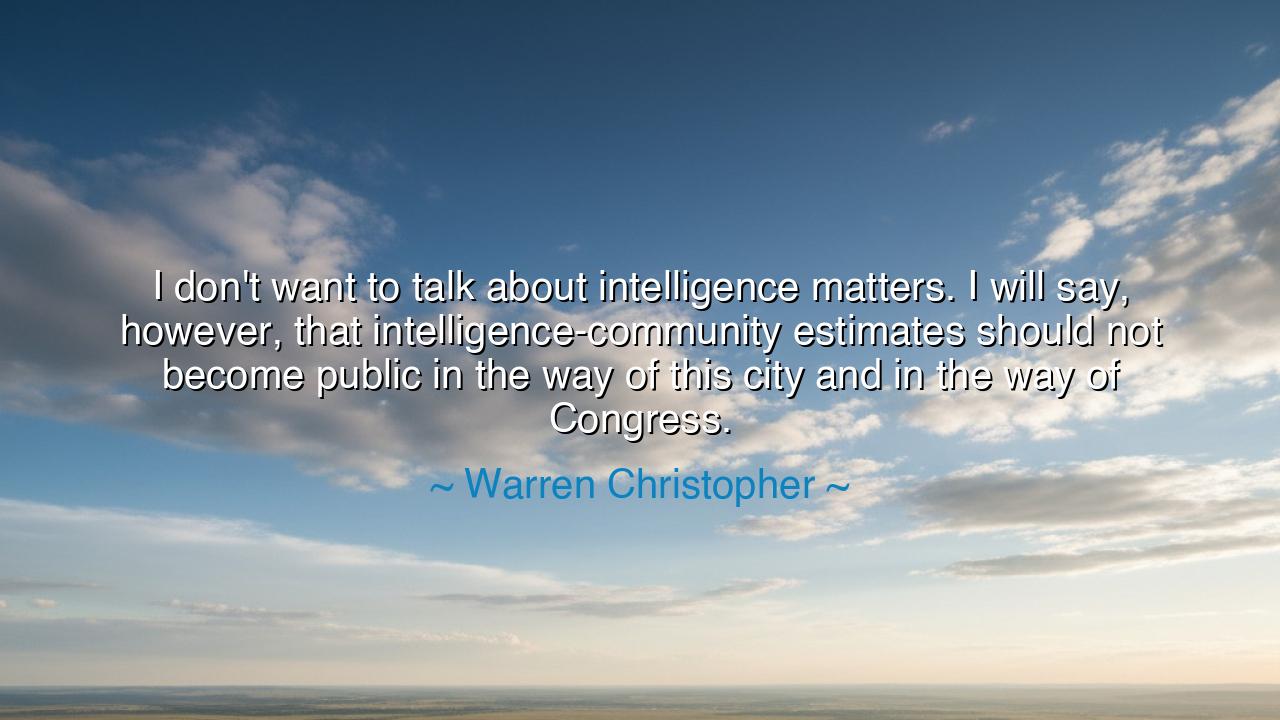
I don't want to talk about intelligence matters. I will say
I don't want to talk about intelligence matters. I will say, however, that intelligence-community estimates should not become public in the way of this city and in the way of Congress.






In the annals of governance and wisdom, there are moments when the deepest truths must be veiled, not to hide them from the people, but to protect them from the very forces that might misuse them. The words of Warren Christopher, “I don't want to talk about intelligence matters. I will say, however, that intelligence-community estimates should not become public in the way of this city and in the way of Congress,” echo this ancient principle—that some knowledge, though necessary for the safeguarding of nations, must remain cloaked in secrecy. This is not a denial of truth, but a recognition that the power of intelligence is not merely in its discovery, but in its judicious use. When exposed too freely, it can become a weapon, not of insight, but of division.
The wise men of old knew well the dangers of a society too eager to reveal its hand. Sun Tzu, in his timeless work The Art of War, warned that knowledge is not only a tool but a weapon—one to be wielded with restraint and purpose. To reveal too much is to hand over control to those who would not hesitate to use it for their own gain. Christopher’s words are a modern reflection of this ancient wisdom. When intelligence estimates, those sacred assessments of a nation's safety and strategy, are released too readily, they lose their power. What was once a quiet, controlled stream of information becomes a flood, subject to distortion, manipulation, and, at worst, exploitation.
This idea is not just theoretical, for history has shown the consequences of careless revelations. Consider the Pentagon Papers, a classified study of the United States' political and military involvement in Vietnam, which, when leaked to the press, sparked a firestorm of controversy. What was meant to be a calculated and controlled series of documents, providing strategic foresight, was turned into a tool of public upheaval. Instead of clarity, it sowed confusion and distrust, both within the nation and between governments. This, too, was an instance where the intelligence community's estimates—intended for the decision-makers—became public in a way that was never meant to be. The results were far-reaching, damaging not only the nation's stability but the trust between its leaders and its people.
Christopher’s caution against the public release of intelligence matters is not a call for secrecy for secrecy’s sake. It is a reminder that knowledge, like fire, can be both a light and a destructive force. When too many eyes look upon it, or when it is used recklessly, it can spread beyond control. Just as fire must be carefully tended, so too must sensitive information be guarded. For in the wrong hands, it becomes more than a tool for protection—it becomes a means of division and destruction.
The lesson here is clear and profound: discretion is as valuable as knowledge itself. In our own lives, we must recognize that not all things should be shared in the open. There are times when silence speaks louder than words, and when withholding information is the greater act of wisdom. The world, like the halls of government, is filled with people who seek knowledge, not to understand, but to control. And we must ask ourselves, in our own decisions, if the truth we seek to share will enlighten, or whether it will serve only to further entrench divisions. As Christopher's words remind us, prudence is the true mark of wisdom.
This principle also teaches us the importance of trust and responsibility. The burden of knowledge often falls not on the many, but on the few—those entrusted with the safety and well-being of nations, families, and communities. Their role is not to hoard power, but to act as stewards of wisdom, understanding that some things, though true, must remain hidden for a time. They are the guardians of the greater good, and their duty is to weigh when and how to release the floodgates of information, always aware of the consequences.
And so, to the leaders of tomorrow, to the thinkers and doers who will inherit the earth: remember this truth, passed down from the wisdom of the ancients to the realities of today. Knowledge must be wielded with great care. Understand that there are times to speak, but there are also times to remain silent. Just as the wise king does not reveal the secrets of the realm to the unprepared masses, so too must each of us guard the treasures of our minds and actions. In the dance of truth and discretion, let us remember that the greatest wisdom lies not in revelation, but in restraint—knowing when to speak, and knowing when silence is the greater power.






AAdministratorAdministrator
Welcome, honored guests. Please leave a comment, we will respond soon